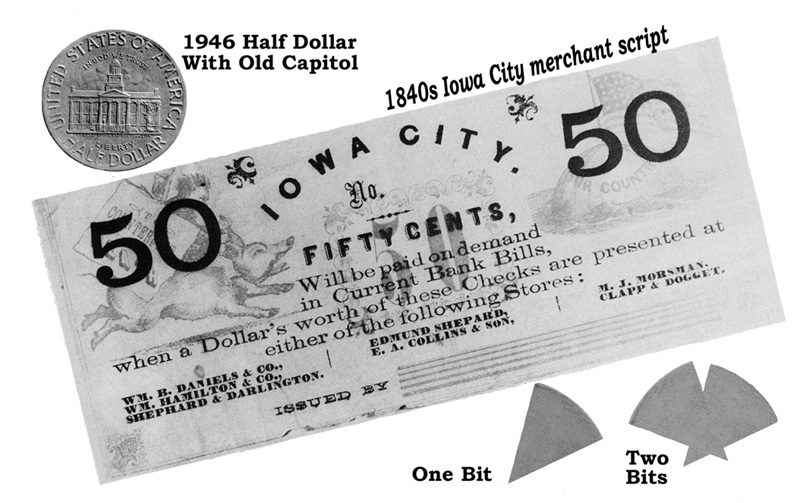
| JOHNSON COUNTY IAGenWeb Project |
Copyright
2003
By Bob Hibbs
Saturday
September 27, 2003
Saturday Postcard 213: Pioneer Money Problems

Graphic by Bob Hibbs
Coins like the Old Capitol 50-cent piece now make commerce easy. During pioneer times, Old Capitol builders and city workers
received wages in script. Barter was common. Silver dollars were cut into eight pieces called bits; thus two bits equaled a quarter.
Half a bit was worth 6¼ cents, the price of an Iowa Avenue ferry ride in 1840.
|
By Bob Hibbs Iowa City pioneers faced money problems every day,
not just from being poor, but from a lack of coins and paper money in
circulation. Barter was common. The merchant traded goods for a chicken
later. Uniform federal currency didn’t exist until Iowa
City banker Ezekiel Clark recommended it to Abraham Lincoln’s treasury
secretary Salmon P. Chase during the Civil War. Clark thus became the
father of the U.S. greenback dollar bill. During the pioneer era, paper money called script
was issued by banks everywhere – except in Iowa for a time when it was
outlawed by the first state constitution since the practice was so
corrupted by fraud. A St. Louis bank script denominated at $5 might be
worthless if the bank no longer existed, something that occurred
regularly. The $5 script might be worth a dollar or two when traded for
goods; in other words, heavily discounted. Silver dollars and foreign silver coins of like
weight often were cut into eight pieces to provide small coins for use
in everyday commerce. The pieces were called bits; thus two bits
equaled a quarter. Also cut in even smaller pieces, half a bit provided
the 6¼ cents one needed to ride the ferry across the Iowa River at Iowa
Avenue or the other local landings in 1840. If a coin wasn’t available, the ferry master
probably would grant credit toward firewood, or for another wanted
item. Short term credit to buy groceries – or a winter’s grub stake –
was a frequent occurrence. A group of Iowa City merchants banded together to
issue 10¢, 20¢ and 50¢ notes for change, redeemable in merchandise at
any of the stores, or in bank currency when presented in amounts
totaling $1. Iowa City was fortunate to have the territorial
government in the person of Iowa City founder Chauncey Swan issuing
script to workmen for wages, and to suppliers of materials used to
build Old Capitol. Territorial script was considered safe if it could
be held long enough for future payment. During the national financial panic of 1857, Iowa
City government issued script in $1, $2, $3 and $5 denominations to pay
for materials and wages. It
was redeemed at face value in 1862 and destroyed, except for samples
given the State Historical Society. The 1857 panic was devastating in many of the same
ways as was the Great Depression of the 1930s. It halted most activity,
even in the remote frontier community of Iowa City. Planned construction of Old Brick was sidetracked
as local Presbyterians were unable to generate the resources necessary
to undertake a project even though they were homeless after loss of
their building to fire in 1856. A cornerstone for Old Brick was set in
1856, but it was 1865 before a building was produced and dedicated. The panic coincided with the move of Iowa’s capital
from Iowa City to Des Moines, providing a double blow to the local
economy. The University of Iowa, nominally opened in 1855, was shut
down in 1857 except for its high school classes, and not reopened for
good until 1860. An infant banking system came into being in 1858
with the opening of 15 offices of the State Bank of Iowa, including one
in Iowa City run by “father of the greenback” Ezekiel Clark. The state
required its banks to redeem their paper notes in coin on demand; thus
the phrase, “Good as gold.” The state banks in Iowa yielded to federal national
banks during the later years of the Civil War, finally alleviating the
problems presented by lack of a reliable currency in circulation,
something taken for granted today. Next time a coin is slipped into a meter or
machine, recall how grateful the Iowa City area pioneer would have been
just to have had one at all. Next
Saturday: Like ancient times, old
building parts are recycled locally. Bob Hibbs collects local postcards and researches history related to them. |